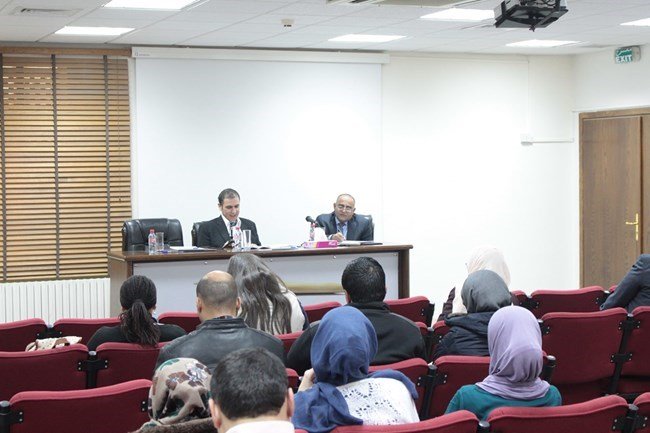Image:

25 Feb 2017
(Jordan Media Institute) -- Samir Barhoum, chief editor of The Jordan Times, has affirmed that "truth" must be the primary and ultimate objective of any teaching, educational, and media process, specifically as we are experiencing a new so-called "post-truth" era whereby appeals to emotion and personal beliefs might be more influential than facts in shaping public opinion. <br />
<br />
In a lecture entitled "Media in Post-Truth Era" at the Jordan Media Institute (JMI), moderated by JMI Dean Dr. Basim Tweissi, Barhoum added that given the extensive use of social media and smart phones and tablets, there is a pressing need for more efforts to eradicate digital illiteracy, not only from a technological point of view, but also from an intellectual, behavioral, legal, and educational point of view. <br />
<br />
He called for protecting people, especially children, from the dangers of using modern media in the "post-truth" era, which spreads lies and fuels sentiments and populism with the aim of making personal gains. This can be achieved through media literacy to educate children and teach them how to distinguish information and facts from other opinions, rumors, controlled media, and appeals to emotions. <br />
<br />
He said that the website of the Oxford Dictionary selected "post-truth" to be Word of the Year 2016, explaining that it denotes "circumstances in which objective facts are less influential in shaping public opinion than appeals to emotion and personal belief."<br />
<br />
He said that the notion of "post-truth" had been used in the last decade, but that it has become more common in 2016, especially within the context of the US presidential elections in which Donald Trump became president of the United States. This is in addition to the referendum on Brexit. Britain's membership in the EU has been one of the casualties of this era in view of some lies associated with promoting Brexit and exaggerating fears among citizens about the consequences of Britain staying within the EU. <br />
<br />
Barhoum pointed out that the "post-truth era" could make the public embrace professional media anew. The attack by the new US presidency on The New York Times has increased its readership in terms of subscribers and visitors of electronic sites. These increases have reflected on the prices of the newspaper's shares by 42%. Also, CNN and Fox News have experienced an increase in viewership. <br />
<br />
This rise is attributed to the nature of the unprecedented political events, which have kept Americans and others glued to their TVs and made them follow the major serious newspapers in a bid to make sense of these developments. He said: While it is true that many people turn to social media to stay informed, many also seek to have complete information, in-depth coverage, and reliable analyses, which can only be obtained from credible and reputable establishments, and not from social media activists. <br />
<br />
Such developments open our eyes to the difference between social media, which is effectively a conduit for delivering information, and other sources of information, which could be an ordinary individual or a politician who has a particular agenda or a professional media organization that enjoys a measure of professional responsibility. There is also a difference between those who convey information without scrutiny and those who confirm information and try to balance it and seek to go deeper and analyze it through accessing reliable sources that are free from bias. <br />
<br />
This makes a professional media person stand out because that person is committed to covering the truth in a balanced manner away from emotions or any other considerations that could affect his objectivity. This also leads to the necessity of teaching and educating children on the use of modern technology, in addition to critical thinking, development, deducing facts, and distinguishing truth from other feelings, beliefs, and claims. <br />
<br />



